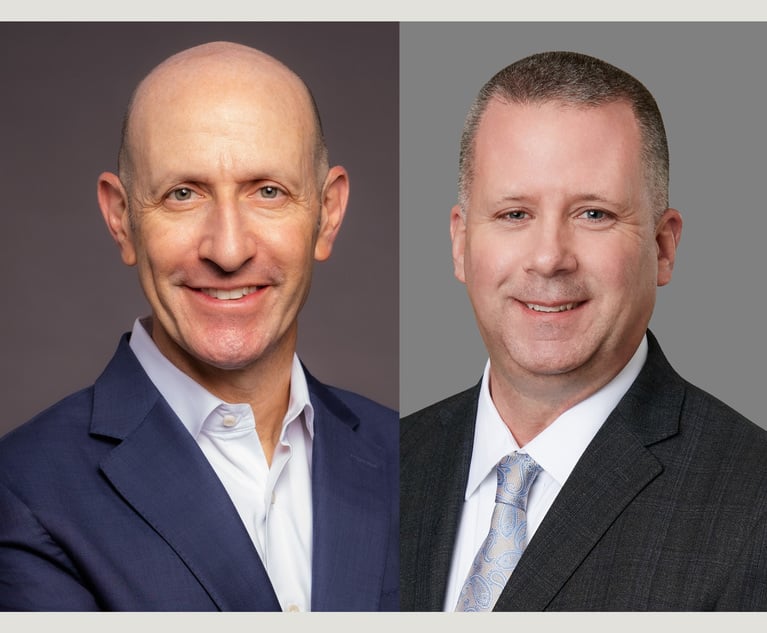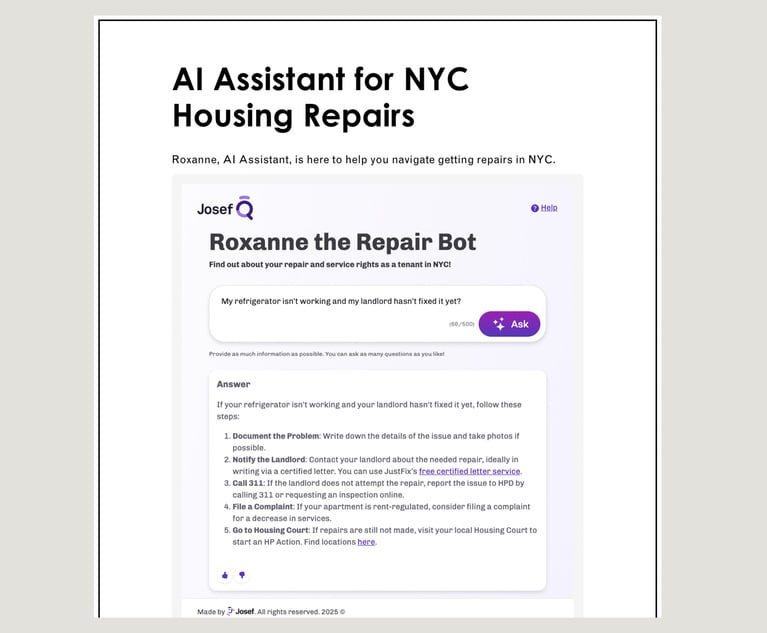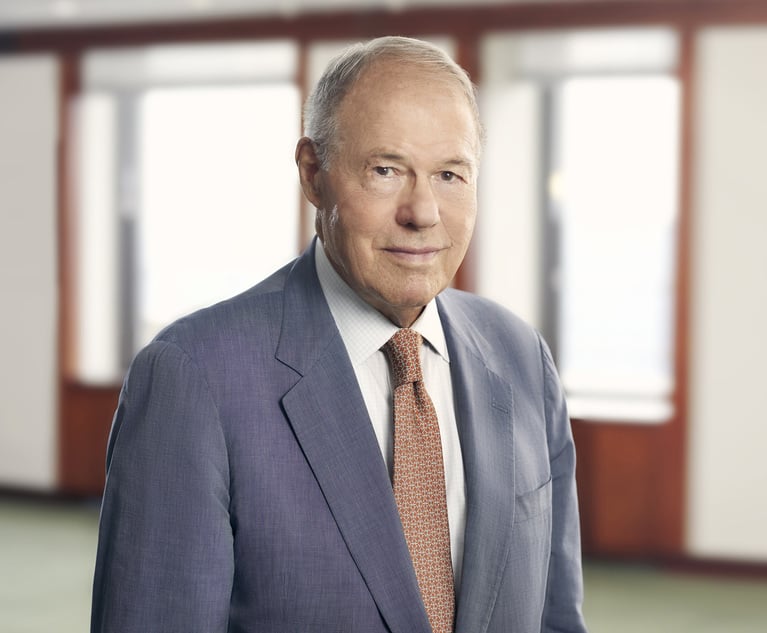 Judge Jack Weinstein. Photo: David Handschuh/ALM
Judge Jack Weinstein. Photo: David Handschuh/ALMJudge Weinstein Says Year Rule in Local Fed Bar Sponsorship 'Appears Unnecessary'
U.S. District Judge Jack Weinstein said the local rules in Brooklyn and Manhattan federal courts that a new attorney's sponsor know the applicant for a year could be barriers to under-represented parts of the bar.
March 20, 2019 at 03:47 PM
4 minute read
Brooklyn federal court should consider revamping the requirement that attorneys who seek to practice in New York's federal courts get a veteran lawyer to vouch for them after at least one year's acquaintance, U.S. District Judge Jack Weinstein of the Eastern District of New York has said in a new opinion.
Weinstein made that recommendation in dicta, but it did not have an impact on his decision to dismiss a suit challenging on broad constitutional grounds the admission requirements to the bar in the district.
Attorney Robert Doyle filed suit against the Eastern District clerk's office in August 2018. The Vanderbilt University Law School alumnus has been admitted to practice in New York since 2006, according to a search of state attorney registration records. He is currently listed as an attorney with the law office of Todd Bank, who was the attorney of record for Doyle.
The suit alleged numerous constitutional violations by the practice of requiring a current member of the Eastern District federal bar vouch for an applicant's character and experience.
Doyle claimed the process violates his due process, equal protection rights, and freedom of association rights because they force him to make disclosures and undertake activities that face the immoral risk of a sponsor possibly claiming to know his character when the person does, in fact, not. This belief, he claims, is fundamental to his self-identity.
As part of his decision, Weinstein surveyed the federal court system's local rules to see where the Eastern District stood by comparison. According to his findings, fully half of the nation's 94 district courts have adopted sponsorship requirements. Eight circuit courts have done the same, as has the U.S. Supreme Court.
Doyle claimed any court doing so represents an unconstitutional delegation of legislative authority to the federal court system. Pointing to federal law established by the Judiciary Act of 1789, Weinstein found the delegation of authority was rightfully delegated, and provided the courts with the “express authority to enact desirable local rules to conduct the business before them” before dismissing Doyle's claim.
Weinstein likewise dispatched Doyle's constitutional claims. There wasn't “the slightest hint” that the sponsorship rule was employed in any discretionary way. No deprivation of liberty or property rights supported a due process claim, nor had any suspect class impairments been established, Weinstein found. Likewise, the rules don't target anyone's speech or viewpoint, and whatever minuscule impact on freedom of expression it could have “does not rise to the level of a constitutional violation.”
“It is necessary for the court to rely upon the good moral character and the intellectual capability of the attorneys before it, partly to protect the clients and partly to protect the court and the public,” the judge wrote.
While the rules don't represent the kinds of violations Doyle claimed, Weinstein did see good reason for both Eastern District and the Southern District to reconsider their mirrored requirements that a sponsor know an applicant for a year.
The judge noted that only five other district courts impose a similar requirement, one he said “appears unnecessary.”
“A sponsoring lawyer should not need to know an applicant for a year to fairly assess his or her character and experience,” Weinstein said. “It creates avoidable problems for first-time applicants, as well for those attorneys new to the New York area, who may not have access to the same networks as many of their peers.”
The judge went further, arguing that the requirement could actually “needlessly exclude” good attorneys who lack “the requisite professional and social connections.”
“In our unequal society, we should be encouraging those on the lower end of the socioeconomic ladder, with less acquaintanceships with lawyers, to enter the legal profession as a means to move up in status and to support themselves and their families—as well as to help others,” he said.
Bank, Doyle's attorney, did not respond to a request for comment.
Related:
This content has been archived. It is available through our partners, LexisNexis® and Bloomberg Law.
To view this content, please continue to their sites.
Not a Lexis Subscriber?
Subscribe Now
Not a Bloomberg Law Subscriber?
Subscribe Now
NOT FOR REPRINT
© 2025 ALM Global, LLC, All Rights Reserved. Request academic re-use from www.copyright.com. All other uses, submit a request to [email protected]. For more information visit Asset & Logo Licensing.
You Might Like
View All
Meet the Long Island Judge Tapped to Be US Attorney for Eastern District of New York
2 minute read
New York’s Property Tax Incentives and Abatements Make Development Feasible
7 minute read
Josef Partners With NYU, Housing Court Answers to Launch AI Assistant Built for Tenants

Trending Stories
- 1Big Company Insiders See Technology-Related Disputes Teed Up for 2025
- 2Attorney Fee Reimbursement for Non-Party Subpoena Recipients under CPLR 3122(d)
- 3‘Second’ Time’s a Charm? The Second Circuit Reaffirms the Contours of the Special Interest Beneficiary Standing Rule
- 4Lobbying-Focused Brownstein Hyatt Opens 13th Office in Tampa
- 5Amid Race for Top Talent, Latham Focuses on Lateral Integration
Who Got The Work
Michael G. Bongiorno, Andrew Scott Dulberg and Elizabeth E. Driscoll from Wilmer Cutler Pickering Hale and Dorr have stepped in to represent Symbotic Inc., an A.I.-enabled technology platform that focuses on increasing supply chain efficiency, and other defendants in a pending shareholder derivative lawsuit. The case, filed Oct. 2 in Massachusetts District Court by the Brown Law Firm on behalf of Stephen Austen, accuses certain officers and directors of misleading investors in regard to Symbotic's potential for margin growth by failing to disclose that the company was not equipped to timely deploy its systems or manage expenses through project delays. The case, assigned to U.S. District Judge Nathaniel M. Gorton, is 1:24-cv-12522, Austen v. Cohen et al.
Who Got The Work
Edmund Polubinski and Marie Killmond of Davis Polk & Wardwell have entered appearances for data platform software development company MongoDB and other defendants in a pending shareholder derivative lawsuit. The action, filed Oct. 7 in New York Southern District Court by the Brown Law Firm, accuses the company's directors and/or officers of falsely expressing confidence in the company’s restructuring of its sales incentive plan and downplaying the severity of decreases in its upfront commitments. The case is 1:24-cv-07594, Roy v. Ittycheria et al.
Who Got The Work
Amy O. Bruchs and Kurt F. Ellison of Michael Best & Friedrich have entered appearances for Epic Systems Corp. in a pending employment discrimination lawsuit. The suit was filed Sept. 7 in Wisconsin Western District Court by Levine Eisberner LLC and Siri & Glimstad on behalf of a project manager who claims that he was wrongfully terminated after applying for a religious exemption to the defendant's COVID-19 vaccine mandate. The case, assigned to U.S. Magistrate Judge Anita Marie Boor, is 3:24-cv-00630, Secker, Nathan v. Epic Systems Corporation.
Who Got The Work
David X. Sullivan, Thomas J. Finn and Gregory A. Hall from McCarter & English have entered appearances for Sunrun Installation Services in a pending civil rights lawsuit. The complaint was filed Sept. 4 in Connecticut District Court by attorney Robert M. Berke on behalf of former employee George Edward Steins, who was arrested and charged with employing an unregistered home improvement salesperson. The complaint alleges that had Sunrun informed the Connecticut Department of Consumer Protection that the plaintiff's employment had ended in 2017 and that he no longer held Sunrun's home improvement contractor license, he would not have been hit with charges, which were dismissed in May 2024. The case, assigned to U.S. District Judge Jeffrey A. Meyer, is 3:24-cv-01423, Steins v. Sunrun, Inc. et al.
Who Got The Work
Greenberg Traurig shareholder Joshua L. Raskin has entered an appearance for boohoo.com UK Ltd. in a pending patent infringement lawsuit. The suit, filed Sept. 3 in Texas Eastern District Court by Rozier Hardt McDonough on behalf of Alto Dynamics, asserts five patents related to an online shopping platform. The case, assigned to U.S. District Judge Rodney Gilstrap, is 2:24-cv-00719, Alto Dynamics, LLC v. boohoo.com UK Limited.
Featured Firms
Law Offices of Gary Martin Hays & Associates, P.C.
(470) 294-1674
Law Offices of Mark E. Salomone
(857) 444-6468
Smith & Hassler
(713) 739-1250






